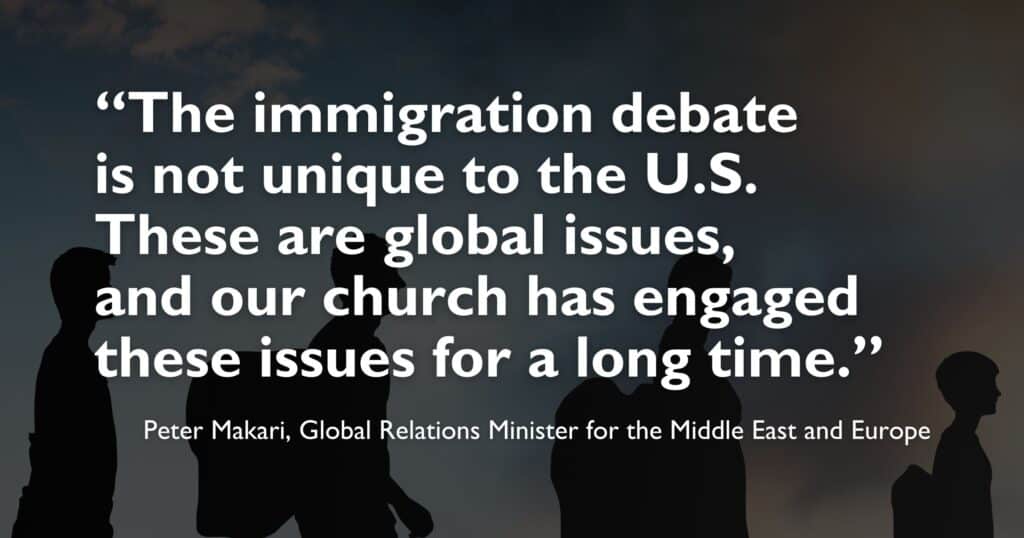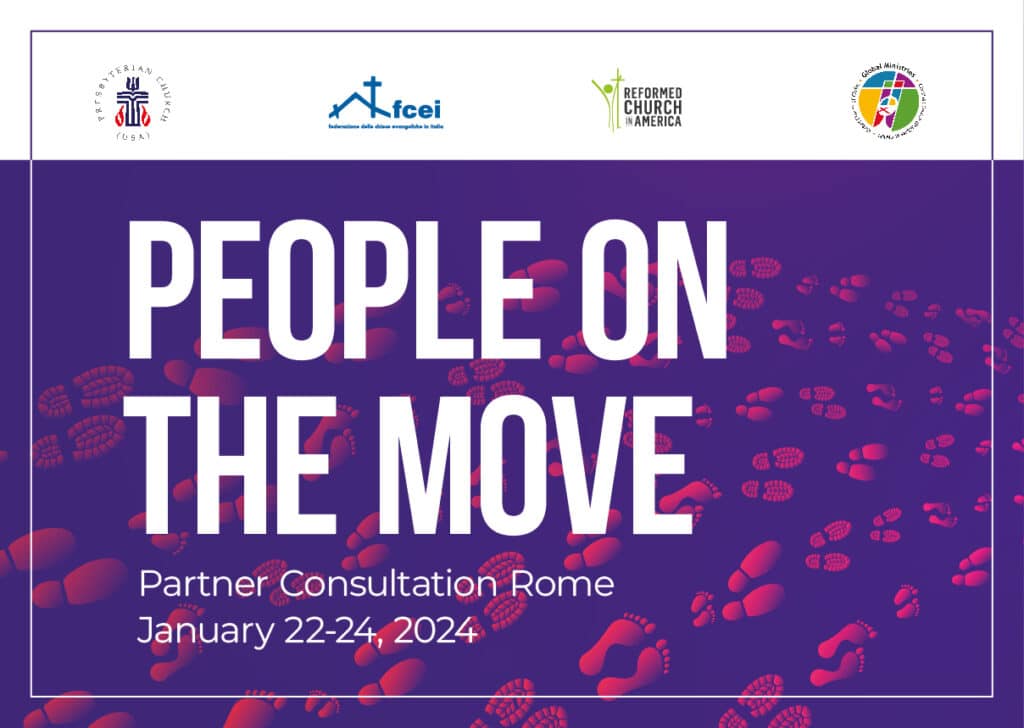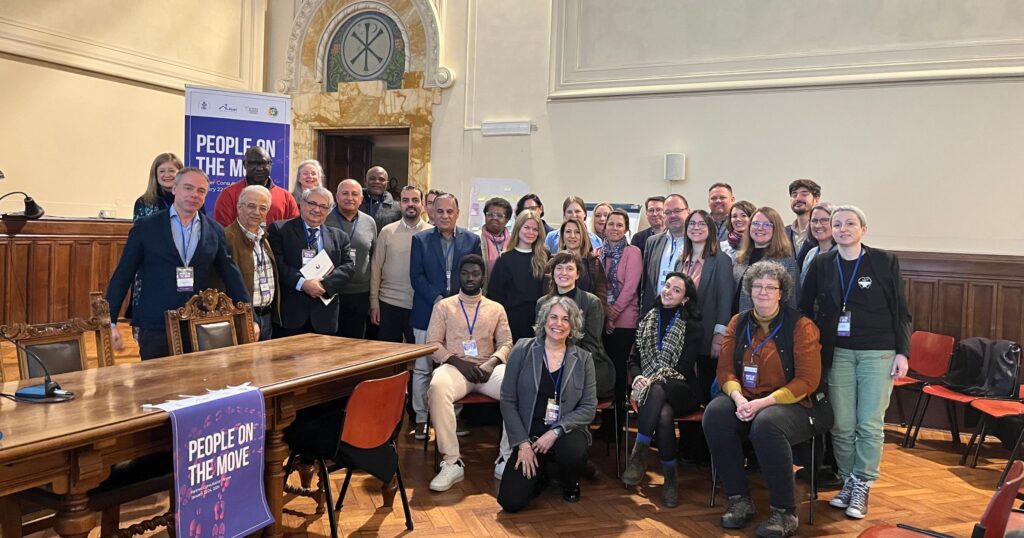‘Immigration debate is not unique to U.S.’: Global Ministries co-sponsors Rome conference on migration, refugees
While heated policy debates and threats to programs for migrants, refugees, and asylum seekers continue in the United States, similar conversations are being held across the ocean.
Global Ministries, the common witness of the United Church of Christ and Christian Church (Disciples of Christ), recently co-sponsored a conference in Rome called “People on the Move” alongside Mediterranean Hope — the refugee and migrant program of the Waldensian Church and the Federation of Protestant Churches in Italy — the Presbyterian Church (U.S.A.), and the Reformed Church in America.
The ecumenical partners gathered in late January to uplift the voices of displaced people, listen to their lived experiences, and share their common witness as Christians pushing for more welcoming, humane, and just immigration policies.
“What we hoped to do was humanize the issue,” said Peter Makari, global relations minister for the Middle East and Europe with Global Ministries.
As with the United States, frequent stories on the impact of government policies, increasing numbers of people seeking refuge, and the dangers migrants face in their journeys continue to dominate headlines. But rarely do those stories contain the voices and perspectives of the most central figures: the people who are migrating themselves.
Makari explained that the “People on the Move” conference aimed to center the first-hand accounts of those who often risked their lives to leave their homes in search of a safer place for themselves and their families.
History of advocacy and accompaniment
The urgency of hearing and responding to people in need is felt among international partners, Makari said, “particularly at a time when debates in Europe mirror some of the debates in the U.S. around xenophobia and racism.”
In addition to these stories, the conference explored the root causes of displacement — especially for refugees from the Middle East and Africa — how European churches advocate for programs to reduce the danger of sea crossings, and recommendations for next steps.

Makari noted, both during and after the conference, that many UCC and Disciples members have been involved in this work, locally and abroad, for years.
“Our mission personnel and U.S.-based leadership have not only witnessed but have actively accompanied partners in the Middle East over the past century of forced migration — and displacement — of peoples,” Makari wrote in a paper he presented at the conference. “Starting with the Armenian Genocide, then later with the impacts on the Palestinian people of an-Nakba (1948), an-Naksa (1967), and right to this today in Gaza, where almost all of the 2.3 million Palestinians there have been displaced in the last three and a half months.”
In response to refugees from Palestine, Syria, Iraq, and other Middle Eastern countries, Makari added, “our churches have been directly involved, not just with humanitarian response, but also with advocacy, particularly with regard to U.S. policy.”
He also noted that the situation at the U.S.-Mexico border shares “similarities with global contexts, including Southern Europe-North Africa.”
Hearing stories, taking action
The similarities in policy debates and the overlap in issues demonstrate a need for a widespread response, Makari explained.
“The immigration debate is not unique to the U.S. These are global issues, and our church has engaged these issues for a long time,” he said. “Even more importantly, I would encourage people to engage on a personal level, to hear people’s stories, to understand their experiences, so that the personal informs policy advocacy.”
Sharing those personal stories publicly is not always possible, due to the sensitive nature of identifying people seeking safety and potential danger to them and their families. So Makari recommends that UCC congregants and churches contact Global Ministries’ area offices — as well as agencies in their own communities — to help determine how they can learn more about global and local efforts.
“We’re engaged with supporting partners around the world who are involved in compassionate response to the needs of people who are sometimes stuck in great despair and at the end of their tether,” he said. “And our members can support the work by participating in refugee resettlement and immigrant advocacy and helping to raise awareness.”
He cited a resolution passed by General Synod in 2019, “Addressing the State of Global Forced Migration.” The resolution urges UCC members to “support of denominational partners around the world who are responding to the needs of displaced people, whether they are refugees, migrants, internally displaced, asylum seekers, or others, through Global Ministries and One Great Hour of Sharing,” the special mission offering currently being promoted in settings across the UCC.
The resolution also called for participation in resettlement programs and advocacy for human rights and intersecting justice issues — such as environmental, economic, and racial justice.

Connection and solidarity
As seen during the conference in Rome, those “partners around the world” include some of the oldest Protestant traditions in the world — notably, the Italian Waldensian Church, part of the Federation of Protestant Churches in Italy.
The Waldensians, who trace their heritage back to the 12th century prior to the Reformation, will celebrate the 850th anniversary of their movement this year, according to Makari.
“They are very progressive,” he said. “They are engaged in social justice issues in their context. They are a church that is proud of their witness. They stand for many things that we hold dear in the UCC.”
For ecumenical partners like these, “People on the Move” presented an opportunity to build connection and solidarity between like-minded Christians.
“We’ve been working on this for some time,” Makari said. “The hope was to bring partners together to explore migration in the Mediterranean, to examine and humanize these issues. These are real people who are affected by policies, people who are on the move.”
Making those connections, recognizing shared experiences, and receiving affirmation of the impact of their work was a major benefit gained by conference attendees, Makari asserted. “Oftentimes, people engaged in migrant and refugee services feel like they are working alone and in contexts that aren’t always friendly to that work.”
He hopes that these partners can keep building momentum and “broadening the scope” for this work.
“People felt the connection,” he said. “It was good to be among partners and friends.”
Content on ucc.org is copyrighted by the National Setting of the United Church of Christ and may be only shared according to the guidelines outlined here.
Related News
A Moment of Silence
The weekend news was alarming. Two students shot and killed with 9 injured at Brown University...
Read MoreIn hope-filled worship service, UCC and United Church of Canada celebrate full communion past and future
On Saturday, Dec. 13, many from the United Church of Christ (UCC) and the United Church of...
Read More‘A Gift of God to the World:’ Christmas greetings from the General Minister and President
As Christmas quickly approaches, UCC General Minister and President/CEO the Rev. Karen Georgia...
Read More


